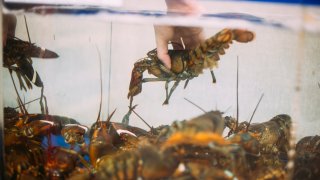What to Know
- The owner of a Maine lobster restaurant claimed giving weed to lobsters might ease their suffering from being boiled in water
- So, a team of biology researchers put lobsters in a vapor chamber containing THC, the high-inducing chemical in marijuana
- The researchers observed lobsters moving more slowly after consuming the drug, but the THC dose didn't have much effect on the lobsters' reactions to hot water
Can lobsters get high, and does it ease the experience of going into the pot?
Science moves a bit more slowly than the news cycle, but researchers unveiled their crack at real answers this week, after a Maine lobster shop owner got lots of coverage for a unique kitchen experiment.
The research is following up on the burning red, unanswered questions about lobsters and cannabis. In 2018, the owner of Charlotte's Legendary Lobster Pound in Southwest Harbor, Maine, claimed to NPR that lobsters would feel more at ease getting cooked after having a dose of marijuana - which is recreationally legal in the Pine Tree State.
Charlotte Gill told the news outlet she was looking for a more humane method to cook the crustaceans, after the nation Switzerland passed a law requiring lobsters to be unconscious before boiling.
The lobsters who got some hits from a vape before cooking were not sold to paying customers, though the business got some chiding from the state health authority anyway. The business invited the scientific community to investigate the claims further.
And in preliminary research results posted May 25, biologists from the University of California San Diego, Colorado College, the University of Washington and the Scripps Research Institute took inspiration from Gill's preferred lobster-intoxication method.
It's called the "vapor chamber."
Basically, it's a plastic box with a low level of water - just enough to cover the lobster - and a hole in the side. In the experiment, THC from a vape cartridge was pumped through a hose into this lobster hotbox, at varying concentrations.
Then a camera tracked the lobsters' movements before and after doses and compared them to the sober levels.
In short: pot (the drug) seems to slow lobsters' movement down, but it doesn't seem to slow their reflexes or significantly change their reactions to the heat of the pot (the lobster death trap/human dinner source).
Also of interest: the research seems to show for the first time that lobsters can have temperature-sensitive reactions to threatening conditions.
In another part of the experiment, researchers dunked different parts of the lobster into a water bath and timed their reactions. As the water got hotter, the lobsters reacted more quickly - with tails appearing to be the most sensitive and crusher claws the least.
But the reaction times didn't change much for the crustaceans exposed to THC. In an indirect way, the researchers seemed to be telling Gill to slow her lobster roll.
